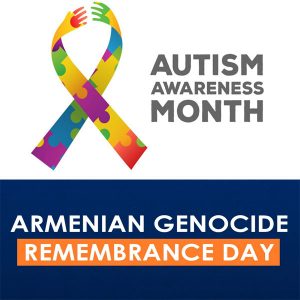 This month, the IDEAs Council wants to discuss Autism Acceptance Month and Armenian Genocide Remembrance Day.
This month, the IDEAs Council wants to discuss Autism Acceptance Month and Armenian Genocide Remembrance Day.
April is technically called Autism Awareness Month, but we are modifying that to a more accepting and less offensive term by calling it Autism Acceptance Month. It is a time to promote acceptance and understanding of people on the autism spectrum.
Autism is a neurodevelopmental disorder that affects communication and social interaction. It is a spectrum condition, which means the severity of symptoms can vary widely from person to person. Some people with autism may have difficulty with social interactions and communication, while others may have more severe cognitive impairments.
Despite the challenges that some people with autism face, it is critical to recognize and celebrate the unique strengths and abilities of individuals on the autism spectrum. Many people with autism excel in areas such as music, art and mathematics, and can make valuable contributions in their communities. It is important to remember that people with autism are more than just their diagnosis. By promoting acceptance and understanding of people with autism, we can create a more inclusive and supportive society for everyone. During Autism Acceptance Month, it is essential to educate ourselves and others about autism, advocate for the rights of people with autism and celebrate the diversity and individuality of people on the autism spectrum. Together, we can create a world where everyone is accepted and valued for who they are.
***
April 24 is Armenian Genocide Remembrance Day and people around the world pay tribute to the victims of the Armenian Genocide. It is a day to honor the memory of those who were killed and stand in solidarity with the Armenian people. It is also a day to remember the importance of acknowledging and preventing such atrocities from occurring in the future. By learning about the Armenian Genocide and other genocides, we can work toward creating a more peaceful world.
We’ve invited Karine Shamlian from the PA office share her family history about Armenian Genocide.
“When I was first asked to write an article about Armenian Genocide Remembrance Day for the April newsletter, I thought to myself, how ironic? Not only will I be sharing my family’s experience during the first genocide of the 20th century, but I’ll also be sharing what has the potential to become a second attempt at an Armenian genocide in the 21st century.
Three of my four grandparents were survivors of the Armenian Genocide which claimed 1.5 million lives. I grew up listening to each of my grandparents’ unique stories of witnessing the loss of family members, fleeing their homeland and reestablishing their lives elsewhere in the world. I’ll share the first-hand accounts of my paternal grandmother who was just five years old on April 24, 1915. That is the date when the Young Turks who ruled the Ottoman Empire issued the decree to round up Armenian intellectuals and political figures who were eventually killed. This was quickly followed by the killing of able-bodied Armenian men and forcing women, children and the elderly into mass deportations through the Syrian Desert.
My grandmother’s father was taken away and killed. Her family was forcibly removed from their home and into the desert on death marches where her mother, older brother and baby brother died. My grandmother and her older sister were forced into servitude in Turkish homes and separated, only to be reunited years later in an orphanage. My grandmother and grandaunt were located by their uncle living in the United States who paid for their passage to the States. At the age of 12, my grandmother traveled from Aleppo, Syria to Boston by herself. She would go on to live to be 109 years old as the matriarch of five generations.
Today, nearly 6,000 miles away in a small, unrecognized country called Artsakh, also known as Nagorno-Karabagh, a second Armenian genocide is in the making. Artsakh, once part of ancient Armenia, is ethnically Armenian. During the fall of the Soviet Union, the people of Artsakh held a referendum to gain independence at the same time as the other constituent republics. Their referendum was denied, and war broke out. Since the initial war of independence, Azerbaijan initiated two additional wars with the aim of ethnically cleansing the Armenians of Artsakh, the latest of which was in 2020. An extremely fragile ceasefire has held; however, the people of Artsakh are constantly facing the existential threat of being wiped off their millennia-old homeland by the Azeri government.
Since December 12, under the guise of an “eco-activist protest” Azerbaijan has blockaded the only corridor between Artsakh and the rest of the world. For more than 100 days, international human rights groups have issued repeated warnings to immediately lift the blockade and allow people and goods to pass into and out of Artsakh to no avail. To date, very limited food and medical supplies make it through the checkpoints and the only vehicles allowed to cross are those of the Red Cross. The people of Artsakh are surviving with rationed food supplies and limited basic utilities including electricity, gas, water and internet. This is growing to be a serious problem and more awareness is needed to stop this looming atrocity.”
To learn more about how you can help prevent a second Armenian genocide, visit MarchToJustice.org.
The council is excited to announce our two newest members, Frances Cohen and Micaela Solomon!
IDEAs Council topics for the coming months:
May – Eid-Al-Fitr and World Day For Cultural Diversity for Dialogue and Development
June – Native American Citizenship Day and Juneteenth
July – International Non-Binary and Disability Independence Day and Nelson Mandela Remembrance Day

